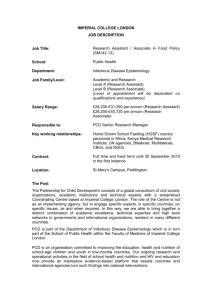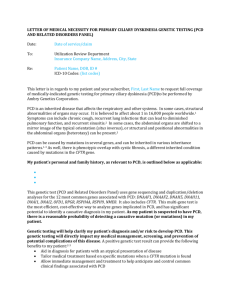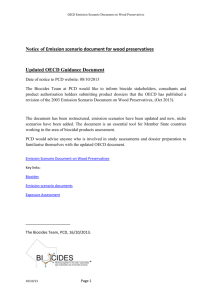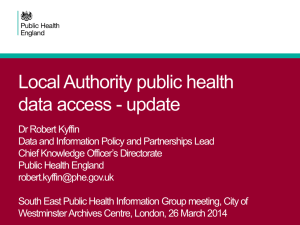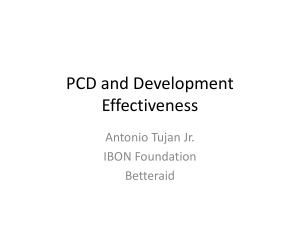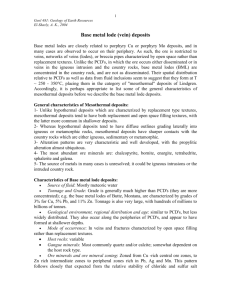DOCX - American University Washington College of Law
advertisement
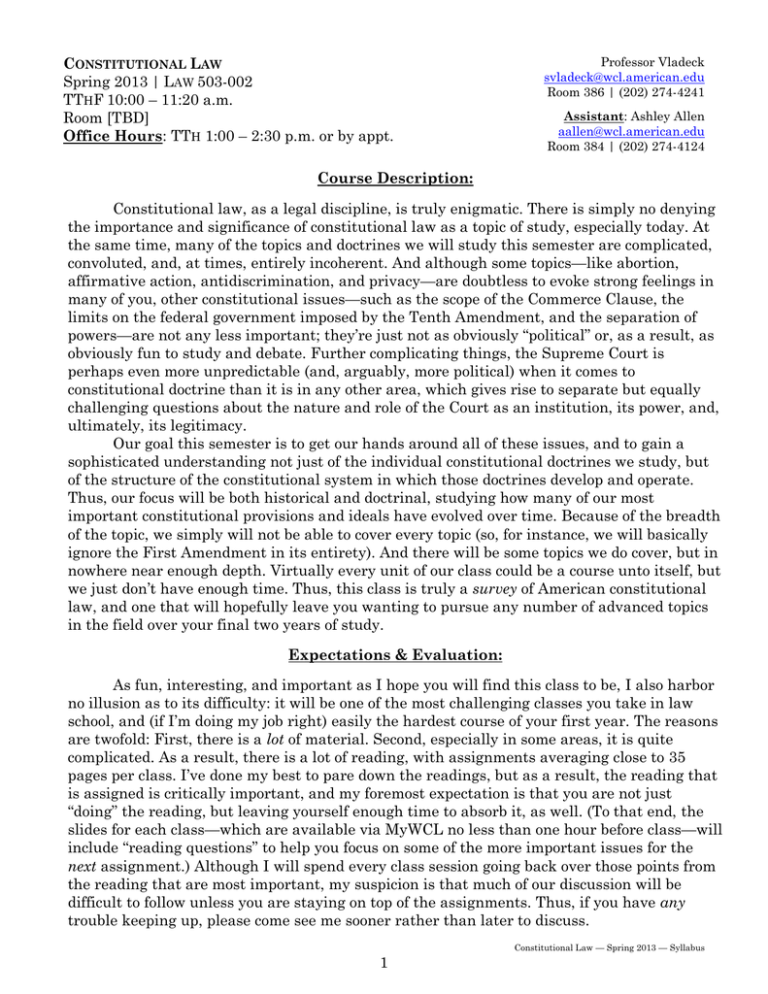
CONSTITUTIONAL LAW Spring 2013 | LAW 503-002 TTHF 10:00 – 11:20 a.m. Room [TBD] Office Hours: TTH 1:00 – 2:30 p.m. or by appt. Professor Vladeck svladeck@wcl.american.edu Room 386 | (202) 274-4241 Assistant: Ashley Allen aallen@wcl.american.edu Room 384 | (202) 274-4124 Course Description: Constitutional law, as a legal discipline, is truly enigmatic. There is simply no denying the importance and significance of constitutional law as a topic of study, especially today. At the same time, many of the topics and doctrines we will study this semester are complicated, convoluted, and, at times, entirely incoherent. And although some topics—like abortion, affirmative action, antidiscrimination, and privacy—are doubtless to evoke strong feelings in many of you, other constitutional issues—such as the scope of the Commerce Clause, the limits on the federal government imposed by the Tenth Amendment, and the separation of powers—are not any less important; they’re just not as obviously “political” or, as a result, as obviously fun to study and debate. Further complicating things, the Supreme Court is perhaps even more unpredictable (and, arguably, more political) when it comes to constitutional doctrine than it is in any other area, which gives rise to separate but equally challenging questions about the nature and role of the Court as an institution, its power, and, ultimately, its legitimacy. Our goal this semester is to get our hands around all of these issues, and to gain a sophisticated understanding not just of the individual constitutional doctrines we study, but of the structure of the constitutional system in which those doctrines develop and operate. Thus, our focus will be both historical and doctrinal, studying how many of our most important constitutional provisions and ideals have evolved over time. Because of the breadth of the topic, we simply will not be able to cover every topic (so, for instance, we will basically ignore the First Amendment in its entirety). And there will be some topics we do cover, but in nowhere near enough depth. Virtually every unit of our class could be a course unto itself, but we just don’t have enough time. Thus, this class is truly a survey of American constitutional law, and one that will hopefully leave you wanting to pursue any number of advanced topics in the field over your final two years of study. Expectations & Evaluation: As fun, interesting, and important as I hope you will find this class to be, I also harbor no illusion as to its difficulty: it will be one of the most challenging classes you take in law school, and (if I’m doing my job right) easily the hardest course of your first year. The reasons are twofold: First, there is a lot of material. Second, especially in some areas, it is quite complicated. As a result, there is a lot of reading, with assignments averaging close to 35 pages per class. I’ve done my best to pare down the readings, but as a result, the reading that is assigned is critically important, and my foremost expectation is that you are not just “doing” the reading, but leaving yourself enough time to absorb it, as well. (To that end, the slides for each class—which are available via MyWCL no less than one hour before class—will include “reading questions” to help you focus on some of the more important issues for the next assignment.) Although I will spend every class session going back over those points from the reading that are most important, my suspicion is that much of our discussion will be difficult to follow unless you are staying on top of the assignments. Thus, if you have any trouble keeping up, please come see me sooner rather than later to discuss. Constitutional Law — Spring 2013 — Syllabus 1 Formally, 1/3 of your grade will be based on a two-hour take-home midterm examination (administered via MyWCL) that you can take during any two-hour period beginning at 12:00 a.m. (EST) on Wed., Feb. 27, and ending at 11:59 p.m. (EDT) on Mon., Mar. 4. The midterm will cover all of the material up through—and including—class on Tuesday, February 26. The other 2/3 of your grade will be based on an in-class, open-book, three-hour exam administered during finals (which will be non-cumulative, and will only cover material beginning with class on Thursday, February 28). I also reserve the right to “bump” your final grade up or down one iteration (e.g., B+ to A- or B) based upon your in-class participation. In class, I plan on cold-calling, as much to allow everyone an equal opportunity to participate in the discussion as to assure that you come to class prepared. I will rotate through the class, however, so that one-half of the class will be “on call” for each session. A word about attendance is in order. You must generally attend class, except where circumstances necessitate — and unpreparedness is not one such circumstance (nor, to be clear, is a pending rhetoric assignment); I’d rather you come to class unprepared than not come to class. Beginning with Class #2 (wherein you will also choose your seats), I will take attendance by circulating a sign-in sheet. If you need to be absent, you must let me know in advance of class, preferably via e-mail. Because of ABA guidelines, I will have to intervene (and, to be clear, reduce your grade) should you miss more than the occasional class. A Note on Laptops in the Classroom . . . : Don’t panic. This is not the point in the Syllabus where I tell you that you are prohibited from bringing laptops to class and using them to take notes. Instead, this is the point in the Syllabus where I tell you that I think it’s a really bad idea to use a laptop to take notes, and an even worse idea to use a laptop for other forms of entertainment during class. Georgetown Professor David Cole has a very powerful and thorough explanation for why in a Washington Post op-ed, Laptops v. Learning (Apr. 7, 2007, at A13), which I encourage you to read. I have a simpler one: The class discussions are integral to your understanding of the course material, and are the frequent subject of my exam questions. As such, it’s much more important that you digest and absorb the class discussion than that you transcribe it wordfor-word. And whether you believe it or not, laptops, by enabling the latter (i.e., transcriptions of class), effectively prohibit the former. Instead, you may find it far easier to take notes by annotating printouts of the slides, which, again, will be posted to MyWCL before each class. An Important Note End-of-Semester Timing: Just so you are aware in advance, I will be leaving the country on Thursday, April 25, to teach a course at our sister school, Ritsumeikan University, in Japan—and will not be back in D.C. during the exam period. I will do my best to hold extra office hours and review sessions before I leave, and to make myself as available as possible to you via e-mail from Japan. That said, please do keep in mind as you are planning your study schedule that you’ll be limited to e-mail contact with me from April 25 through our final exam… Course Website and E-Mail: Finally, please note that I will use your official AU e-mail for all communication, so it is your responsibility to either check that account frequently, or to set it up to forward to another account that you check even more frequently. I also will post all course materials, non-casebook readings (the “Handouts”), assignments, updates, etc., to MyWCL. Constitutional Law — Spring 2013 — Syllabus 2 Syllabus “PCD”: PAUL BREST ET AL., PROCESSES OF CONSTITUTIONAL DECISIONMAKING (5th ed. 2006) “SUPP.”: PAUL BREST ET AL., PROCESSES OF CONSTITUTIONAL DECISIONMAKING (2012 Supp.) “HANDOUT [#]”: HANDOUTS, AVAILABLE VIA MYWCL [Names in Blue]: Focus of our “Better Know a [Supreme Court Justice]” for that class—I’ll explain… 1. Introduction: The Purpose(s) and Meaning(s) of the Constitution [Thursday, January 10] The Constitution [PCD 1–15] Background to the Constitution [PCD 19–26] Chapter 1, §§ I–III [PCD 27–37] 2. McCulloch v. Maryland [Friday, January 11] [J. Marshall] Chapter 1, § IV [PCD 38–64; skip “Excursion into Louisiana”] Chapter 1, § V [PCD 67–74] [* * * NO CLASS ON TUESDAY, JANUARY 15 OR THURSDAY, JANUARY 17 * * *] 3. The Marshall Court and Judicial Review [Friday, January 18] [Jay, J. Rutledge, & Ellsworth] Chapter 2, §§ I–III(B) [PCD 97-122; through note 2 on pg. 122] Chapter 2, § III(D) [PCD 126–36] 4. Does Judicial Review Compel Judicial Supremacy? [Tuesday, January 22] [Taney] Chapter 3, § III(C) [PCD 276–79] HANDOUT I o United States v. Dickerson, 530 U.S. 428 (2000) o Excerpt from Cooper v. Aaron, 358 U.S. 1 (1958) o Parker, Alabama Justices Surrender to Judicial Activism, Jan. 1, 2006 5. Limitations on the Judicial Power [Thursday, January 24] [Kennedy] Chapter 5, § VI [PCD 887–92; SUPP. 198–224 (through note 1)] 6. The Antebellum Court, Slavery, and Dred Scott [Friday, January 25] [Story] Chapter 3, § II(C) [PCD 226–60] Constitutional Law — Spring 2013 — Syllabus 3 7. The Civil War and the “New Birth of Freedom” [Tuesday, January 29] [Salmon Chase] Chapter 3, §§ III(A)–(B) [PCD 261–75] Chapter 3, §§ III(D)–(E) [PCD 279–99] 8. The Fourteenth Amendment: “Privileges or Immunities” [Thursday, January 31] [Field] Chapter 4, § I(A) [PCD 301–10; skip “Unusual Procedural History”] Chapter 4, § I(B) [PCD 319–37; stop at Bradwell v. Illinois] 9. The Fourteenth Amendment: Incorporation [Friday, February 1] [Scalia] Part II Overview [PCD 485–97; SUPP. 59–93] HANDOUT II o Kermit Roosevelt III, What if Slaughter-House Had Been Decided Differently?, 45 IND. L. REV. 61 (2011) 10. The Fourteenth Amendment: Citizenship and Equality [Tuesday, February 5] [Bradley] Chapter 4, § I(B) [PCD 337–51] Chapter 4, §§ II(A)–(B) [PCD 385–405] 11. The Fourteenth Amendment: Race and State Action [Thursday, February 7] [Harlan I] Chapter 4, §§ I(C)–(E) [PCD 351–85] 12. Lochner and the “Lochner Era” [Friday, February 8] [Holmes] Chapter 4, § III(A) [PCD 412–15; skip note on Eminent Domain Clause] Chapter 4, § III(B) [PCD 417–31] Chapter 4, § IV [PCD 435–56] 13. The New Deal and the Emergence of Modern Judicial Scrutiny [Make-Up Class #1: Friday, February 8, 2:30–3:50 p.m., Room TBD] [O. Roberts & Stone] Chapter 5, §§ I(A)–(C) [PCD 499–527] 14. Congressional Power After the New Deal: Commerce, Taxing, and Spending [Tuesday, February 12] [Douglas] Chapter 5, §§ II(A)(1)–(2) [PCD 549–70] Constitutional Law — Spring 2013 — Syllabus 4 15. Congressional Power After the New Deal: The (Section Five) Enforcement Power [Thursday, February 14] [Brennan] Chapter 5, § II(A)(3) [PCD 570–600] 16. Congressional Power and the Modern Court: Lopez and Morrison [Friday, February 15] [Rehnquist] Chapter 5, §§ II(B)(1) [PCD 600–27] [* * * NO CLASS ON TUESDAY, FEBRUARY 19 * * *] 17. Congressional Power and the Modern Court: A Return to Federal Supremacy? [Thursday, February 21] [J. Roberts] Chapter 5, §§ II(B)(1)–(2) [PCD 627–29; SUPP. 99–173] 18. Congressional Power and the Rehnquist Court: The Enforcement Power [Friday, February 22] [Thomas] Chapter 5, § II(B)(3) [PCD 629–49; SUPP.173–80] 19. Congressional Power and the Rehnquist Court: The Tenth Amendment [Tuesday, February 26] [O’Connor] Chapter 5, § III(B) [PCD 649–53; 674–705; stop at the end of note 6] [* * * MIDTERM EXAMINATION AVAILABLE AS OF 12:00 A.M., WEDNESDAY, FEBRUARY 27 * * *] 20. Congressional Power and the Rehnquist Court: The Eleventeenth Amendment [Thursday, February 28] [Souter] Chapter 5, § III(B) [PCD 705–11] HANDOUT III o Vladeck, State Sovereign Immunity and the Roberts Court, 5 CHARLESTON L. REV. 99 (2010) 21. [REVIEW SESSION] [Friday, March 1] [* * * MIDTERM EXAMINATION DUE BY 11:59 P.M., MONDAY, MARCH 4 * * *] 22. Interstate Federalism and Preemption [Tuesday, March 5] [Sotomayor] Chapter 5, §§ III(B)–IV [PCD 712–36] HANDOUT IV o Arizona v. United States, 132 S. Ct. 2492 (2012) o [Additional Reading TBA] Constitutional Law — Spring 2013 — Syllabus 5 23. Executive Power, Part I: The “Non”-Prosecution Power [Thursday, March 7] [Burger] Chapter 5, § V(A) [PCD 736–61] Chapter 5, § V(E) [PCD 881–85] 24. Executive Power, Part II: Appointments, Removal, and the Veto [Friday, March 8] [B. White] Chapter 5, § V(B) [PCD 792–95; SUPP. 181–88] Chapter 5, § V(C) [PCD 795–819] [* * * NO CLASS WEEK OF MARCH 11 (SPRING BREAK) * * *] 25. The Separation of Powers as a Limit on Executive Power [Tuesday, March 19] [R. Jackson] Chapter 5, § V(D)(1) [PCD 819–41; SUPP. 188–98] 26. Executive Power During Wartime [Thursday, March 21] [Black] Chapter 6, § II(A)(2) [PCD 966–79] Chapter 5, § V(D)(2) [PCD 841–71] 27. Executive Power and the War on Terrorism [Friday, March 22] [Stevens] Chapter 5, § V(D)(2) [PCD 878–81; SUPP. 226–65] HANDOUT V o Hamdan v. United States, 696 F.3d 1238 (D.C. Cir. 2012) 28. The Modern Debate Over Racial Equality [Tuesday, March 26] [Frankfurter] 29. Chapter 6, §§ I(A)–(B) [PCD 893–904] Chapter 6, § I(C)(2) [PCD 913–15] Chapter 6, §§ I(D)–(E) [PCD 923–50] Chapter 6, § I(E) [SKIM SUPP. 195–239] Antidiscrimination and the Suspect Classification Doctrine [Thursday, March 28] [Warren] Chapter 6, § II(A) [PCD 956–66, 979–90; skip Korematsu] Chapter 6, § II(B)(1) [PCD 990–93] Chapter 6, § II(B)(4) [PCD 1002–07] Constitutional Law — Spring 2013 — Syllabus 6 30. What Constitutes “Race-Based” Discrimination? [Friday, March 29] [Powell] 31. Chapter 6, § II(D) [PCD 1020–24] Chapter 6, § II(E) [PCD 1026–35; skip Griggs] Chapter 6, § II(F)(1) [PCD 1039–42] Chapter 6, § II(F)(4) [PCD 1055–67] Chapter 6, § II(G)(1) [PCD 1071–77] Race-Based Affirmative Action: Past and Present [Make-Up Class #2: Friday, March 29, 2:30–3:50 p.m., Room TBD] [Alito] Chapter 6, § II(G)(2) [PCD 1109–14] Chapter 6, § II(G)(3) [PCD 1120–51] 32. Race-Based Affirmative Action: The Future [Tuesday, April 2] [Breyer] Chapter 6, § I(E) [SUPP. 267–311] Chapter 6, § II(E) [SUPP. 311–17] HANDOUT VI o Fisher v. Univ. of Texas, 644 F.3d 301 (5th Cir. 2011) (mem.) 33. The Modern Debate Over Gender / Sex Equality [Thursday, April 4] [Ginsburg] Chapter 7, §§ I(A)–(B) [PCD 1179–95] Chapter 7, § III(A) [PCD 1213–19] Chapter 7, § III(C) [PCD 1229–50] 34. What Constitutes “Sex-Based” Discrimination? [Friday, April 5] [Stewart] Chapter 7, §§ IV(A)–(B) [PCD 1262–94] Chapter 7, § IV(C) [PCD 1304–11] 35. Other Suspect Bases of Classification [Tuesday, April 9] [Hughes] Chapter 6, § II(H) [PCD 1156–77] Chapter 7, § VII [PCD 1327–36] 36. Implied Fundamental Rights and Modern Substantive Due Process [Thursday, April 11] [Goldberg] Chapter 8, §§ I–II [PCD 1339–55] Chapter 8, §§ V(A)–(B) [PCD 1387–1409] Constitutional Law — Spring 2013 — Syllabus 7 37. Abortion After Roe [Extended Class: Friday, April 12, 10:00–11:50 a.m.] [Blackmun] Chapter 8, § V(C) [PCD 1422–57; SUPP. 319–42] 38. Other Fundamental Rights [Tuesday, April 16] [Harlan II] Chapter 8, § III [PCD 1355–65] HANDOUT VII o Abigail Alliance v. von Eschenbach, 495 F.3d 695 (D.C. Cir. 2007) (en banc) 39. Sexual Orientation: Equality, Liberty, or Both? [Thursday, April 18] [Kagan] Chapter 7, § III(B) [PCD 1219–24] Chapter 8, §§ VI(A)–(B) [PCD 1482–1519] 40. DOMA, Proposition 8, and the Future of Constitutional Antidiscrimination Law [Friday, April 19] [The Next Justice] HANDOUT VIII o Perry v. Brown, 671 F.3d 1052 (9th Cir. 2012) o Windsor v. United States, 699 F.3d 169 (2d Cir. 2012) 41. The Constitution and the Welfare State [Tuesday, April 23] [T. Marshall] Chapter 9, §§ II–III(D)(1) [PCD 1602–41] Constitutional Law — Spring 2013 — Syllabus 8
